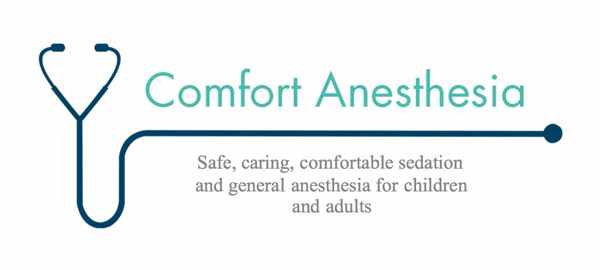For Professionals
Dentists find that offering anesthesia services in their office significantly increases their scope of practice, treatment plan acceptance, and productivity. Challenging patients can be managed safely and effectively in-house, and are better able to afford treatment compared to the hospital setting.
A professional relationship with a residency trained anesthesia provider can transform your practice into an advanced full-service patient care center.
Fees depend on the duration of surgery being performed. Full payment is required on the day of surgery. Patients are able make payments to Comfort Dental Anesthesia directly. We accept all major credit cards, checks, and cash. Special arrangements can be made, so please feel free to contact us for an estimate and to help develop a plan for you.
Insurance
Comfort Dental Anesthesia is out of network with insurance companies. However, some medical and dental insurances will cover total or partial reimbursement for anesthesia services. We can assist patients in filing out a prior authorization and reimbursement claim directly to their insurance. However, the out of pocket payment is required in full on the day of service. If you would like to inquire about filing an insurance claim, feel free to contact us.
Cancellation policy
In order to ensure the safety of our patients, any violation of preanesthestic instructions including food and drink less than 8 hours before surgery may result in the cancellation of the case. Cancellations can be made at the anesthesiologists discretion in order to provide safe care.
Anesthetic services provided can range from IV moderate sedation to general anesthesia. A variety of airway techniques can be employed which may include the use of endotracheal tubes, laryngeal mask airways (LMAs), nasopharyngeal airways, and protective throat screens.
Definitions taken from ADA guidelines:
Moderate/Conscious Sedation
A drug-induced depression of consciousness during which patients respond purposefully to verbal commands, either alone or accompanied by light tactile stimulation. No interventions are required to maintain a patent airway, and spontaneous ventilation is adequate. Cardiovascular function is usually maintained.
Note: In accord with this particular definition, the drugs and/or techniques used should carry a margin of safety wide enough to render unintended loss of consciousness unlikely. Repeated dosing of an agent before the effects of previous dosing can be fully appreciated may result in a greater alteration of the state of consciousness than is the intent of the dentist. Further, a patient whose only response is reflex withdrawal from a painful stimulus is not considered to be in a state of moderate sedation.
The following definition applies to the administration of moderate or greater sedation: titration – administration of incremental doses of a drug until a desired effect is reached. Knowledge of each drug’s time of onset, peak response and duration of action is essential to avoid over sedation. Although the concept of titration of a drug to effect is critical for patient safety, when the intent is moderate sedation one must know whether the previous dose has taken full effect before administering an additional drug increment.
Deep sedation
A drug-induced depression of consciousness during which patients cannot be easily aroused but respond purposefully following repeated or painful stimulation. The ability to independently maintain ventilatory function may be impaired. Patients may require assistance in maintaining a patent airway, and spontaneous ventilation may be inadequate. Cardiovascular function is usually maintained.
General anesthesia
A drug-induced loss of consciousness during which patients are not arousable, even by painful stimulation. The ability to independently maintain ventilatory function is often impaired. Patients often require assistance in maintaining a patent airway, and positive pressure ventilation may be required because of depressed spontaneous ventilation or druginduced depression of neuromuscular function. Cardiovascular function may be impaired. Because sedation and general anesthesia are a continuum, it is not always possible to predict how an individual patient will respond. Hence, practitioners intending to produce a given level of sedation should be able to diagnose and manage the physiologic consequences (rescue) for patients whose level of sedation becomes deeper than initially intended.
A preoperative assessment and evaluation will be completed to review the medical history status, focused physical examination, NPO status, and anesthetic plan.
Once the patient is ready for treatment, the anesthesiologist will begin administering medications and the operator will be able to begin treatment shortly thereafter.
Upon completion of oral health services, the patient will be recovered by the anesthesiologist and subsequently discharged when the patient demonstrates adequate recovery. Patients can be recovered in the same area or moved to a recovery area.
